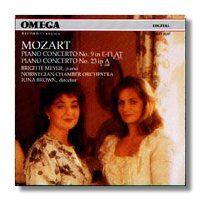
The Internet's Premier Classical Music Source
Related Links
- Mozart Reviews
- Latest Reviews
- More Reviews
-
By Composer
-
Collections
DVD & Blu-ray
Books
Concert Reviews
Articles/Interviews
Software
Audio
Search Amazon
Recommended Links
Site News
 CD Review
CD Review
Wolfgang Mozart

Piano Concertos
- Concerto #9 "Jeunehomme" in E Flat Major, K. 271 (1777)
- Concerto #23 in A Major, K. 488 (1786)
Brigitte Meyer, piano
Norwegian Chamber Orchestra/Iona Brown
Omega 1003 - 58min
Let's get one thing straight at the outset. In Mozart's piano concertos I prefer big orchestras, modern instruments, grand gestures, and fire breathing soloists. After all, that incredible series of barn-storming Columbia LPs by Rudolf Serkin and George Szell introduced me to this repertory. So what do we have here? A minuscule chamber ensemble and reticent soloist who attempt to turn "Mozart the Titan" into one of Swift's Lilliputians. True, modern instruments are employed, but they produce a soft, tiny sound. For her part pianist Meyer rarely, if ever, raises her voice above mezzo forte, and her pianissimos are the merest whisper.
Not surprisingly then, my first impression of this disc was quite negative. But once my ears adjusted the smaller scale and reserved approach of these fine musicians, I found much to appreciate and enjoy. In place of the heroics of the fiery young Alfred Brendel (Vanguard reissue), what we have here is pure poetry. Listening in on the pianist's heartfelt conversations with the solo winds is rather like eavesdropping on a pair of lovers in flagrante. The allegros are bright and bouncy, brimming over with youthful energy and panache. With her fleet tempos, Meyer polishes off Concerto 9 more than two minutes ahead of Brendel, who is hardly lethargic in this music. Although Meyer scrupulously avoids Brendel's theatrics, she's nonetheless a formidable virtuoso in her own right. The dexterity and fluidity of her playing is nothing short of astonishing. The finale, for instance, opens with glorious cascades of shimmering sounds that few, if any, other pianists could match. There's also tremendous warmth in her playing of the score's most lyrical moments – particularly the tender second subject in the opening movement – and the whole is leavened with a welcome dose of gentle good humor.
The soft-spoken, intimate approach of Meyer and Brown may not be wholly appropriate to the boisterous 9th, but it works wonders with Mozart's gentle 23rd Concerto. Once again boundless energy and drive in the joyous outer movements, while the central adagio is simple, direct, yet deeply affecting. Meyer invariably plays with a patrician nobility, but she never fails to touch the heart. Repeated listenings only reinforce my positive impression of this wonderful disc.
The Norwegian Chamber Orchestra is very small ensemble indeed, but their playing is flawless. The modern instruments produce a luminous sound – without any of the tinkling, jangling, scraping, or wheezing of the period bands. Conductor Brown endeavors to bring out Mozart's delicious wind coloring, though Omega's recording clearly favors the pianist. The booklet notes by Philadelphia Orchestra program annotator Bernard Jacobson are both fascinating and informative, but they've been printed so lightly – and in such minuscule type – that they are very difficult to read.
Beware: hear this delightful disc just once, and you're likely fall in love with these familiar concertos all over again.
Copyright © 1997, Tom Godell


















